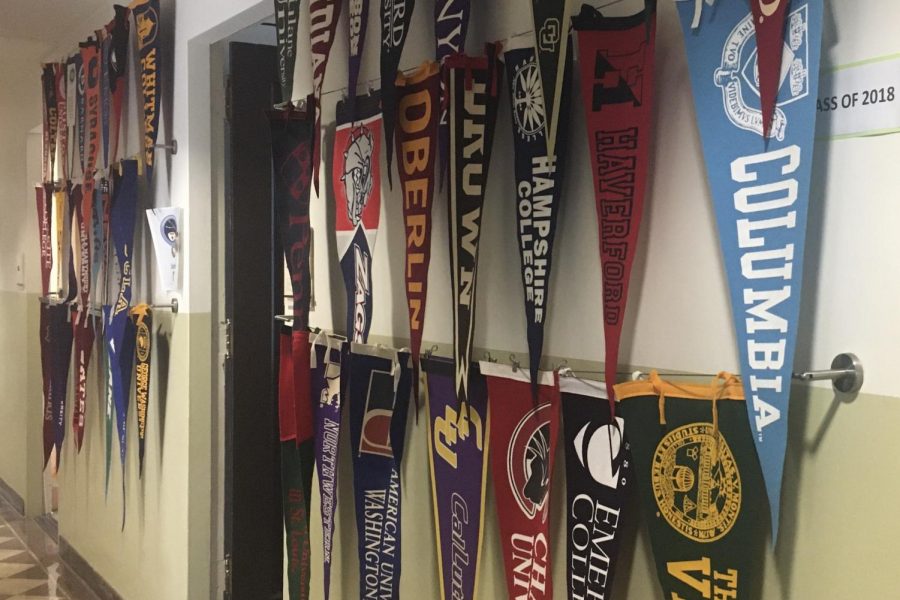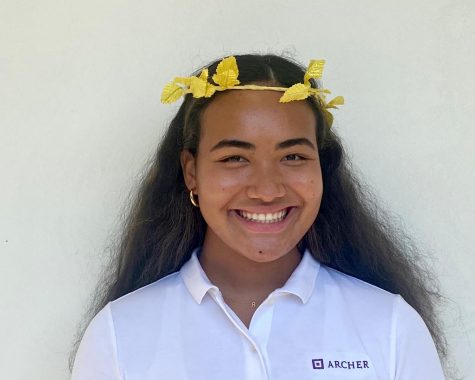Op-Ed: The harmful effects of microaggressions surrounding the college admissions process
Photo credit: Anna Brodsky
In the college admissions corridor, various pennants hang along the walls representing the past two years where Archer graduates have matriculated. For people of color, the harmful effects of microagressions surrounding the college admissions process has become an area of discomfort and discouragement, as topics such as race, athletics and socioeconomic status arise.
December 13, 2020
“What sport do you play?”
“Are you the first in your family to ever attend university?”
“How does it feel to get a full ride?”
“You’ll go on a scholarship of some sort, right?”
These common statements that at times feel neverending, constantly circulate and take up space within my mind as I am reminded that I will only be seen as either the “diversity candidate” or the stereotypical “dumb jock” who doesn’t have sufficient academic credentials.
It’s no secret that the college admissions process is stressful, exhausting and emotionally draining; however, I can only imagine what it must feel like to be admitted into your school of choice and ultimately feel as though you belong.
The consistent barrage of questioning that has absolutely nothing to do with my personal academic interests puts me in an uncomfortable and often discouraging position. I find that I have to repeatedly prove myself to my peers and professors, and I have yet to set foot on a college campus.
Microaggressions are commonplace experiences for many people of color, occurring more often than not in our daily lives. The effects are detrimental and long-lasting, as they perpetually diminish accomplishments — athletic, academic or otherwise — and can prompt people of color to experience imposter syndrome or stereotype threat.
According to a recent Gallup poll, 70% of people of color reported that (white) “people acted as if they were better than [people of color].” Following this, 37% people of color in the poll reported that (white) “people acted as if [people of color] were not smart.”
The numbers don’t lie. As a person of color who is in the beginning stages of the admissions process myself, I am hurt and disappointed that these prejudiced comments are still normalized and defended in society today. While I understand that microaggressions may not always be purposeful or ill-intentioned, it is important to recognize their impact is often drastically different than their intent.
According to a recent article from The Independent, microaggressions have been linked to the phrase “Death by a thousand cuts,” which signifies the trauma people of color experience when their self-worth is repeatedly “cut” and snuffed out.
Our nation is simultaneously experiencing two separate global pandemics: COVID-19 and systemic racism that continuously bolsters microaggressions.
The college process is hard enough. I urge people to become more conscious of racist stereotypes when asking students of color about their future plans. When you add the effects of racial prejudice and stereotypical labels to the already heavy college process, the weight becomes immeasurable. Can you imagine?
I often wonder if legacy admissions face the same amount of scrutiny that many people of color face in relation to the college admissions process as a whole. According to a Wall Street Journal report, “56% of the nation’s 250 institutions consider legacy within the admissions process” and “children of alumni are six times more likely to receive an acceptance letter than ordinary applicants.”
Who really has the upper hand? I’m curious to know if they get asked what sport they play or if they are the college trailblazer in their family.
So yes, to answer your previous questions, I actually do play a sport. And no, I didn’t just pose for the application.
No, I am not the first person in my family to attend university.
If given the opportunity, I’d feel honored to receive a full-ride for my education and athletic abilities, as that is nothing to be ashamed of.
And finally, it is my hope that we can move forward and remember the importance of thinking before you speak and recognizing that everyone will travel down their own paths, and should not be judged collectively.
Do better.











Yalonda • Jan 14, 2021 at 3:00 pm
This article clearly articulates the college process for so many students of color. To see that it still goes on is disheartening. What will it take for things to change and for the playing ground to be fair?!
Tammy Miles Brown • Jan 14, 2021 at 1:50 pm
VRA….I have read your article a couple of times and it just sits with me in so many ways. As a high school administrator, I have seen the effects of micro aggressions on our students of color. Your article helped me think about micro aggressions through the lens of Athletics . You were right.. do better…. must happen. Thank you for your insightful . I will share with my colleagues.
Carla Robinson • Jan 13, 2021 at 8:00 pm
Outstanding work Vaughan! Chase and I enjoyed your article. You so eloquently stated examples of the microaggressions that, unfortunately so many people of color continue to face daily. I am so proud that you are courageous enough to use your voice to teach others how to be more inclusive. Thank you for influencing others to do better by sharing your story (with some strong supporting information). Continue to model inclusive leadership by being the change you want to see!
Mauricio James • Dec 22, 2020 at 7:12 pm
Wow, such a great article. You are wise beyond your age.
Lexi Tooley • Dec 17, 2020 at 7:53 pm
Vaughan, what a great article. The normalization and reinforcement of micro-aggressions surrounding POC and the college admission process are truly unfortunate and need real change. Hopefully, future students, teachers, and all POC seeking higher education won’t have to answer or respond to any of these stereotypical comments/questions, and hopefully one day this college admission playing field will level out. Thank you for writing such an insightful article!
Monica Lee • Dec 17, 2020 at 12:22 pm
I am sorry that we haven’t made more progress with race relations for your generation. It would be wonderful to see white America see black Americans as their equal in my lifetime. Thank you for giving me hope that yours is a generation willing to challenge institutional and systematic racism.
Aisha S. Isaac • Dec 17, 2020 at 9:48 am
Beautifully written, this article touched my soul because it’s the current state of what people of color go through on a regular basis. I am beyond proud of you, continue to speak your truth because it’s necessary to educate those who don’t know. The world better watch out because Miss Vaughan is coming through and there’s no stopping her.
Greg Braxton • Dec 15, 2020 at 9:09 pm
The writing, reasoning and structure could easily be perceived as the work of a seasoned journalist or opinion writer. An exceptional article with so much feeling and depth.
Judy DeLisse • Dec 15, 2020 at 10:20 am
VRA…your article was brilliant and touching. I know that you will overcome every obstacle in your path and achieve great success and happiness. You will be a important voice in the fight for equality!
Forester M Wescott • Dec 15, 2020 at 8:39 am
Yes! The consistent and PURPOSEFUL normalization of these types of phrases are a major part of the system of racism that is so widely supported. Thank you for bringing light to this aspect of what you so sagely referred to as a “second global pandemic”! Keep bringing light and pushing everyone to DO BETTER!!
Lynne Wescott • Dec 15, 2020 at 8:18 am
Vaughan,
Wow! Thank you for sharing this! Such a well thought out and well written article. Can’t wait to see how you go and change the world!
Brianne Shergill • Dec 15, 2020 at 6:15 am
Well said! Thank you for shedding light and sharing your personal experiences on this. The world needs to, as you stated so perfectly, “DO BETTER!”
Julie Sione • Dec 14, 2020 at 9:01 pm
Beautifully written, Wow! Teared up at one part, your points are so valid and clearly stated. Love the comparison to legacy admits, you’re right – no one questions those kids! Had to laugh out loud @ you “…didn’t just pose for the application.”
Hopefully you open a few eyes with this article – well done.
Raiza McDuffie • Dec 14, 2020 at 12:56 pm
Vaughan Anoa’i for President! This is absolutely amazing! I’m so proud of YOU!!!
Tiffany Smith-Anoa'i • Dec 14, 2020 at 11:45 am
Miss V!
This article resonated with me as I faced some of these SAME questions you pose, when I was starting the college process, albeit over 30 years ago!
I’m very proud of you for writing about this topic and how it hits home for you personally. I love that The Oracle provides space for their student journalists to express their opinions about a vast array of topics.
Brava!!!
Chanel Landreaux • Dec 14, 2020 at 11:17 am
Vaughn – this is amazing! Sharing this information and your experiences allows people to EMPATHIZE. They may not understand fully the daily challenges that POC (people of color) are faced with on a daily basis, but expressing your thoughts and sharing your observations allows others to stand with you to make change. Saluting you for this fantastic article. Let’s all try and do better!
Humza Khan • Dec 14, 2020 at 10:47 am
Great article Vaughn! brilliant mind
Lizette Gonzalez • Dec 14, 2020 at 7:17 am
Vaughan, thank you for writing this! So very powerful, proud of you Vaughan!
Nyah Fernandez • Dec 13, 2020 at 11:03 pm
Vaughan, I am literally speechless! I love this Op:Ed so much and thank you for sharing your mind to not only the Archer community but the world! So proud of you!